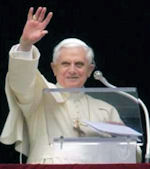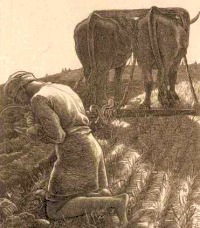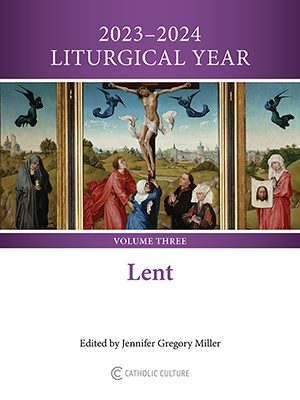» Enjoy our Liturgical Seasons series of e-books!
"The kingdom of heaven is like a treasure buried in a field, which a person finds and hides again, and out of joy goes and sells all that he has and buys that field. Again, the kingdom of heaven is like a merchant searching for fine pearls. When he finds a pearl of great price, he goes and sells all that he has and buys it" (Matt 13:44-46).
Pope Benedict's Angelus Address
 Today, in the liturgy, the Old Testament Reading presents to us the figure of King Solomon, the son and successor of David. It presents him at the beginning of his reign, when he was still very young. Solomon inherited a very demanding task and the responsibility that lay heavily on his shoulders was great for a young king. He first of all offered God a solemn sacrifice, “a thousand burnt offerings”, as the Bible says. Then the Lord appeared to Solomon in a dream by night and promised to grant him what he asked in prayer. And here we see the greatness of Solomon’s soul. He did not ask for a long life, nor wealth, nor the elimination of his enemies; instead he said to the Lord: “Give your servant, therefore, an understanding heart to judge your people and to distinguish right from wrong” (1 Kings 3:9). And the Lord heard him, so that Solomon became famous throughout the world for his wisdom and his right judgements.
Today, in the liturgy, the Old Testament Reading presents to us the figure of King Solomon, the son and successor of David. It presents him at the beginning of his reign, when he was still very young. Solomon inherited a very demanding task and the responsibility that lay heavily on his shoulders was great for a young king. He first of all offered God a solemn sacrifice, “a thousand burnt offerings”, as the Bible says. Then the Lord appeared to Solomon in a dream by night and promised to grant him what he asked in prayer. And here we see the greatness of Solomon’s soul. He did not ask for a long life, nor wealth, nor the elimination of his enemies; instead he said to the Lord: “Give your servant, therefore, an understanding heart to judge your people and to distinguish right from wrong” (1 Kings 3:9). And the Lord heard him, so that Solomon became famous throughout the world for his wisdom and his right judgements.
Therefore he prayed God to grant him “an understanding heart”. What do these words mean? We know that the “heart” in the Bible does not only indicate a part of the body, but also the centre of the person, the seat of his intentions and opinions. We might say: the conscience. Thus an “understanding heart” means a conscience that knows how to listen, that is sensitive to the voice of truth and for this reason can discern right from wrong.
In Solomon’s case, the request was motivated by the responsibility of leading a nation, Israel, the people whom God chose to show the world his plan of salvation. The King of Israel, therefore, had to try always to be in tune with God, listening to his word, in order to guide the people on the paths of the Lord, the path of justice and of peace.
However, Solomon’s example is valid for every person. Each one of us has a conscience so as to be, in a certain way, “king”, that is, to exercise the great human dignity of acting in accordance with an upright conscience, doing what is right and avoiding wrong.
The moral conscience presupposes the ability to hear the voice of truth and to be docile to its indications. People who are called to the task of government naturally have a further responsibility and, therefore — as Solomon teaches — are in even greater need of God’s help. Yet each one has his own part to play, in the concrete situation in which he finds himself. An erroneous mentality suggests to us that we ask God for favourable things or conditions; in fact, the true quality of our life and of social life depends on the upright conscience of each one, on the capacity of one and all to recognize right, separating it from wrong and seeking patiently to put it into practice, thereby contributing to justice and to peace.
Let us ask the Virgin Mary, Seat of Wisdom, for help in this. Her “heart” was perfectly docile to the Lord’s will. Even though she was a humble and simple person, Mary was a queen in God’s eyes, and we venerate her as such. May the Blessed Virgin help us to form in ourselves, with God’s grace, a conscience ever open to the truth and sensitive to justice, to serve the Kingdom of God. – July 24, 2011
Sunday Readings
The first reading is taken from the first Book of Kings 3:5, 7-12. God gives Solomon a choice of gifts. Solomon asks God for "an understanding mind," so that he could always do what was just and best for his subjects. God rewards him with the gift of wisdom making him the wisest man that ever lived. — The Sunday Readings by Fr. Kevin O'Sullivan, O.F.M.
The second reading is from the Letter of St. Paul to the Romans 8:28-30. The theme of this reading concerns the graciousness and mercy of God at work in calling men to himself, justifying them, and glorifying them as well. The point of the reading is the eternal mystery of the ineffable love of God for man, even before man existed. — A Celebrants Guide to the New Sacramentary - A Cycle by Kevin W. Irwin
The Gospel is from St. Matthew 13:44-52. The lesson of these two parables is as true for us today, as it was for those Palestinians to whom Christ spoke. All Christians are called on to imitate the two wise men, and surrender all their earthly possessions if necessary in order to gain eternal life. Does this "giving all" mean that we are all expected to abandon the world and take on the religious vows of poverty, chastity and obedience? There are many who do just this. But it is not the only way, nor the normal way, to purchase the eternal treasure. Heaven is within the reach of all, who follow the ordinary vocations of life and partake of this world's joys and pleasures within the framework of God's commandments, but never lose sight of the goal toward which they are moving.
Keeping within the framework of God's commandments is the difficulty. We need not have a vow of obedience, but we must obey all legitimate authority. We may possess the goods of this world, but only such goods as we lawfully and justly acquire. Nor may we withhold all of these from a fellow man who is in need. We do not have to take a vow of chastity, but yet we must be chaste, we must use the gifts and the pleasure of sex only within the limits set down by God's wise laws.
All of this is not easy for human nature. But we are not relying on weak human nature, we have within our reach in the Church all the spiritual and supernatural aids we need. Our twentieth century, it is true, is so engrossed in chasing after the earthly comforts and pleasures of the body, and so devoid of any spiritual or other-worldly outlook, that even those who know and believe that there is an eternity after death, find it hard to allow their faith and convictions to govern and direct their daily actions. Yet, the evil example of others will never justify our wrong-doing. The commandments of God are still binding, even though they are openly and flagrantly violated by individuals and whole nations today.
Remember this: we shall not be asked at the judgment, "What did your neighbor do?", but "what did you do?" If we lose the pearl of great price in the eternity of happiness God has offered to us-it will not be the fault of others. The fault will be ours and ours only. We refused to pay the price. We did not think it worth the "paltry all" which we possessed in this life.
Excerpted from The Sunday Readings by Fr. Kevin O'Sullivan, O.F.M.








